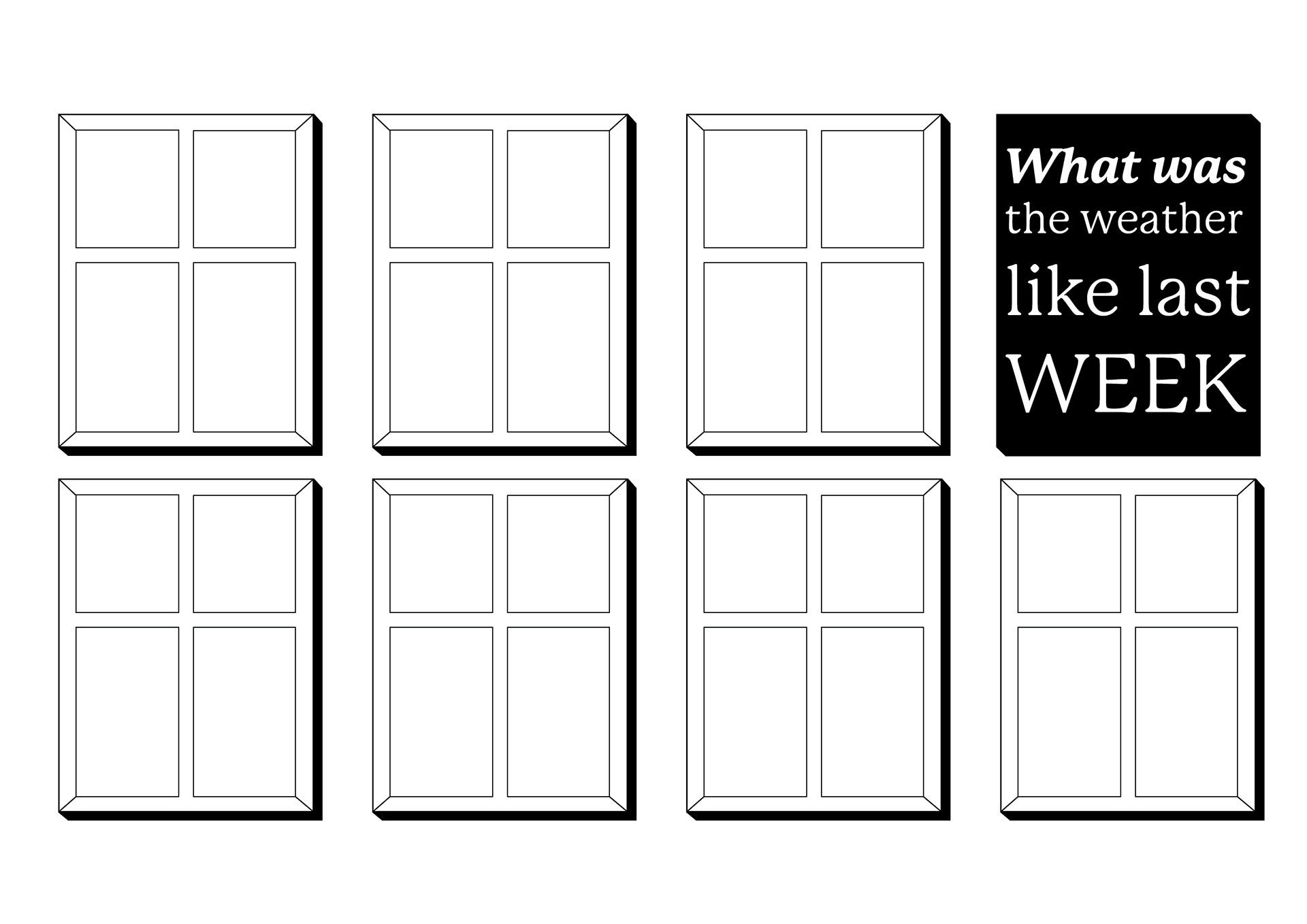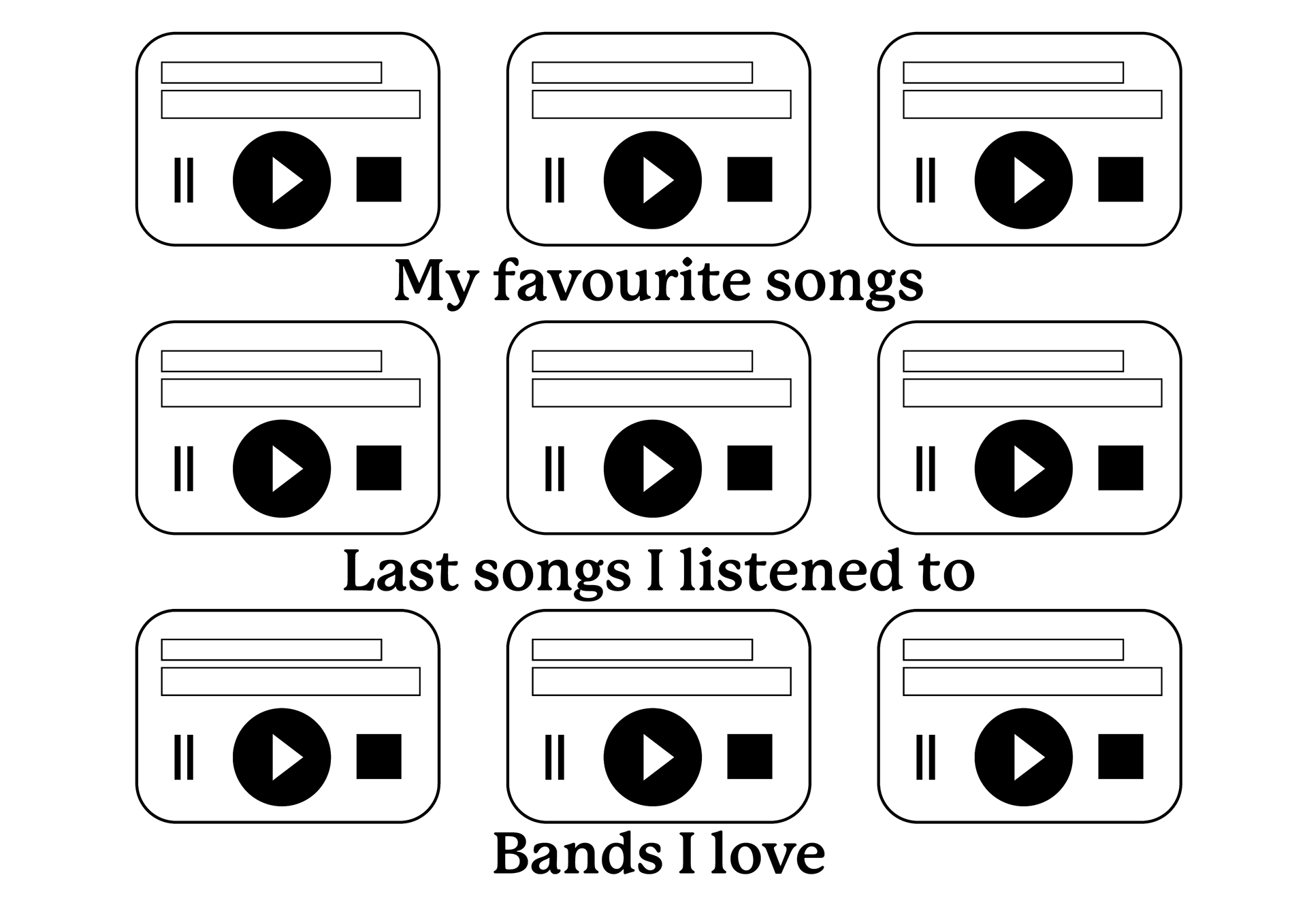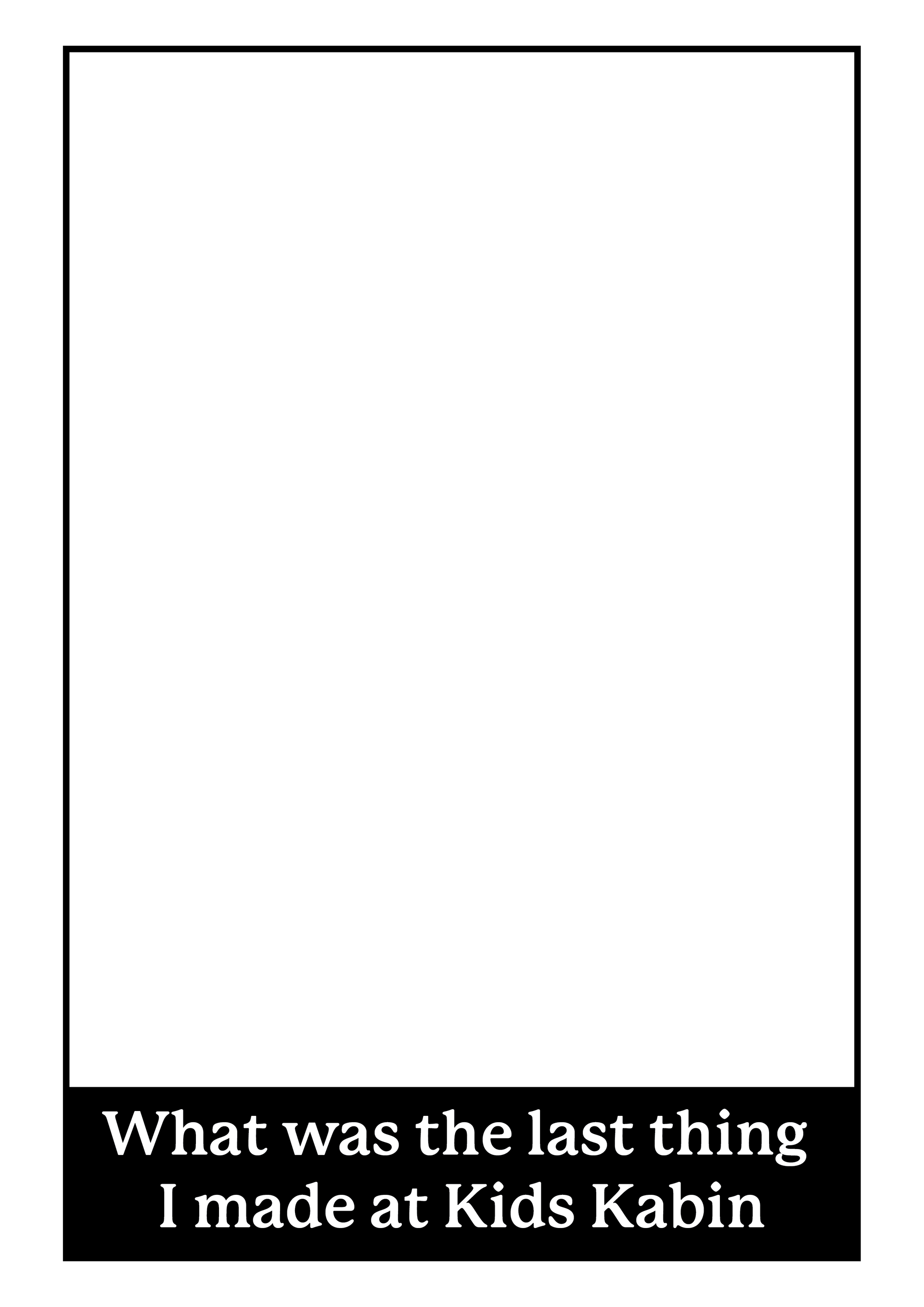TASK:
We are looking for the following:
• A range of creative, high-impact ways of telling the KidsKabin story to a range of stakeholders
• Alternative and innovative ways for children’s voices to be shared – not just through video monologues
• Exciting and accessible ways for children to communicate with others from different places –exploring ways to break down barriers and build relationships
• We would like you to design, pilot and test a range of innovative ideas and approaches which we can take on and embed into our practice in the future.
Improving communications for children’s charity
The aim of the second brief is to give you experience in developing solutions to complex and often systemic social issues in order to make a difference in society. This aim will be achieved by working closely with a public or third-sector organisation to help them tackle a current challenge. This is partially a team-based activity with individual outcomes that may be tackled by working cooperatively or collaboratively in negotiation with your tutors.
Kids Kabin is a charity working in low-income communities in Newcastle and Middlesbrough. We enable children and young people, aged 7-13 to learn new skills and build their confidence by taking part in creative and practical workshops. Workshops include pottery, woodwork, cookery, bike maintenance and arts and crafts. Each year, over 1300 children and young people participate in Kids Kabin activities.
Kids Kabin relies on support from a wide range of sources –trusts and foundations, private donors, corporate supporters, and local authorities. We also have a strong reliance on volunteers to deliver many of our workshops and projects. Notably, we have a team of international, full-time volunteers each year. These volunteers come on 1-year placements from around the world – from countries including the Philippines, Brazil, USA, Spain and Russia. As well as providing capacity, they increase cultural awareness for Kids Kabin participants and bring opportunities for future collaboration.
As Kids Kabin increases in size and reach, new communication opportunities and challenges arise. In a competitive funding environment, we want Kids Kabin to stand out from other charities. We want to communicate the positive impact of the work on children and young people, and we want funders to hearth it. We also want to communicate these messages to other stakeholders, including parents, schools, other organisations and the participants themselves.
We know that the best advocates for Kids Kabin are the beneficiaries themselves. However, we often find that it is the most confident children and young people who are confident to speak on camera and many other voices are not always heard. Potential for children to share stories and learn from others, within Newcastle, between Newcastle and Middlesbrough and internationally. International volunteers provide an excellent network of contacts for developing international creative projects.
We are looking for the following:
• A range of creative, high-impact ways of telling the KidsKabin story to a range of stakeholders
• Alternative and innovative ways for children’s voices to be shared – not just through video monologues
• Exciting and accessible ways for children to communicate with others from different places –exploring ways to break down barriers and build relationships
• We would like you to design, pilot and test a range of innovative ideas and approaches which we can take on and embed into our practice in the future.
Improving communications for children’s charity
The aim of the second brief is to give you experience in developing solutions to complex and often systemic social issues in order to make a difference in society. This aim will be achieved by working closely with a public or third-sector organisation to help them tackle a current challenge. This is partially a team-based activity with individual outcomes that may be tackled by working cooperatively or collaboratively in negotiation with your tutors.
Kids Kabin is a charity working in low-income communities in Newcastle and Middlesbrough. We enable children and young people, aged 7-13 to learn new skills and build their confidence by taking part in creative and practical workshops. Workshops include pottery, woodwork, cookery, bike maintenance and arts and crafts. Each year, over 1300 children and young people participate in Kids Kabin activities.
Kids Kabin relies on support from a wide range of sources –trusts and foundations, private donors, corporate supporters, and local authorities. We also have a strong reliance on volunteers to deliver many of our workshops and projects. Notably, we have a team of international, full-time volunteers each year. These volunteers come on 1-year placements from around the world – from countries including the Philippines, Brazil, USA, Spain and Russia. As well as providing capacity, they increase cultural awareness for Kids Kabin participants and bring opportunities for future collaboration.
As Kids Kabin increases in size and reach, new communication opportunities and challenges arise. In a competitive funding environment, we want Kids Kabin to stand out from other charities. We want to communicate the positive impact of the work on children and young people, and we want funders to hearth it. We also want to communicate these messages to other stakeholders, including parents, schools, other organisations and the participants themselves.
We know that the best advocates for Kids Kabin are the beneficiaries themselves. However, we often find that it is the most confident children and young people who are confident to speak on camera and many other voices are not always heard. Potential for children to share stories and learn from others, within Newcastle, between Newcastle and Middlesbrough and internationally. International volunteers provide an excellent network of contacts for developing international creative projects.
DESIGN QUESTIONS
What questions did we try to answer with
our research:
What are the design challenges?
What are Kids Kabin's needs regarding the brief?
What are Kids Kabin stakeholders and what are their needs?
How do other organisations tell their stories?
What are the benefits of telling stories in charitable work?
What visuals are thriving in a similar project?
our research:
What are the design challenges?
What are Kids Kabin's needs regarding the brief?
What are Kids Kabin stakeholders and what are their needs?
How do other organisations tell their stories?
What are the benefits of telling stories in charitable work?
What visuals are thriving in a similar project?
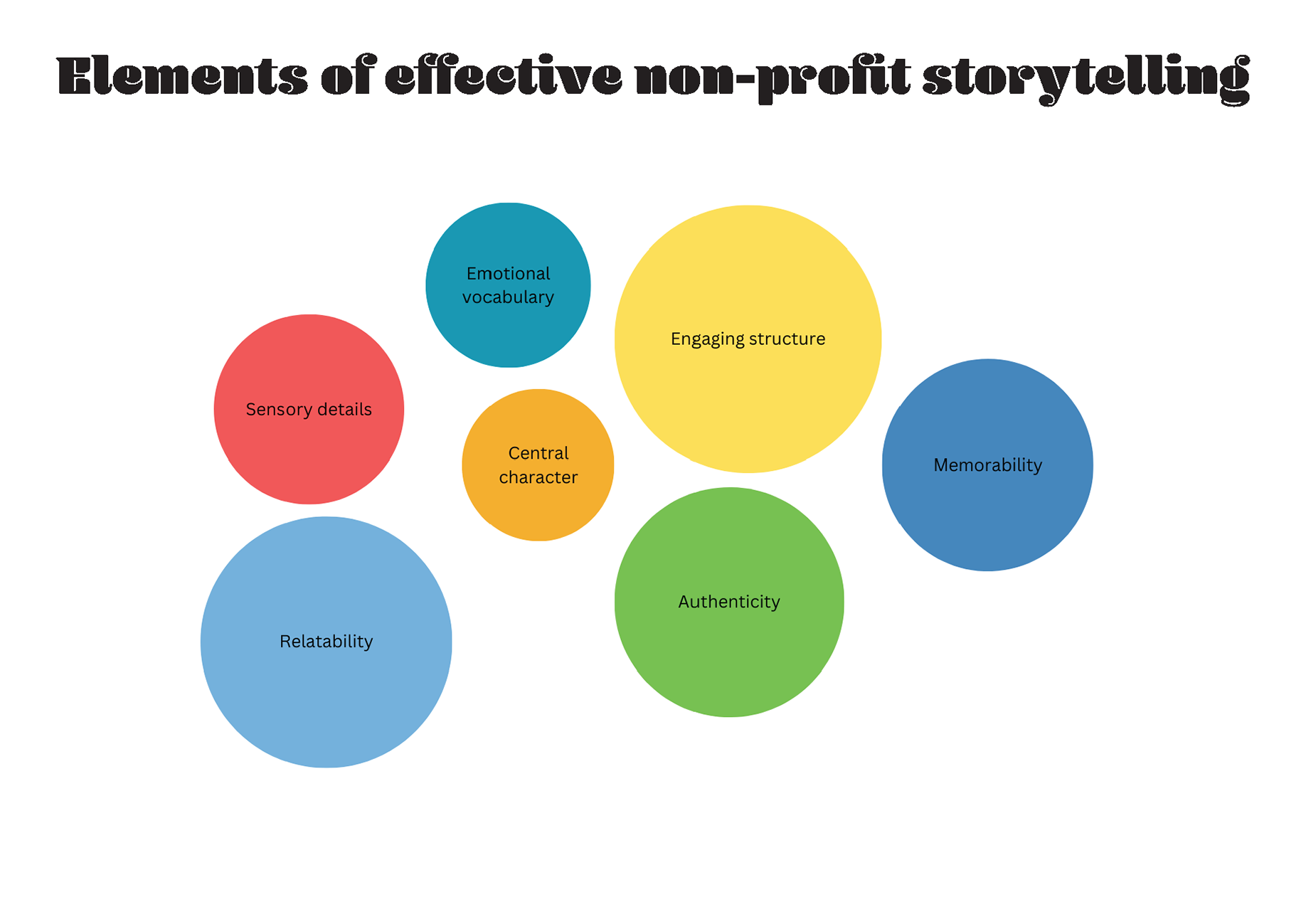
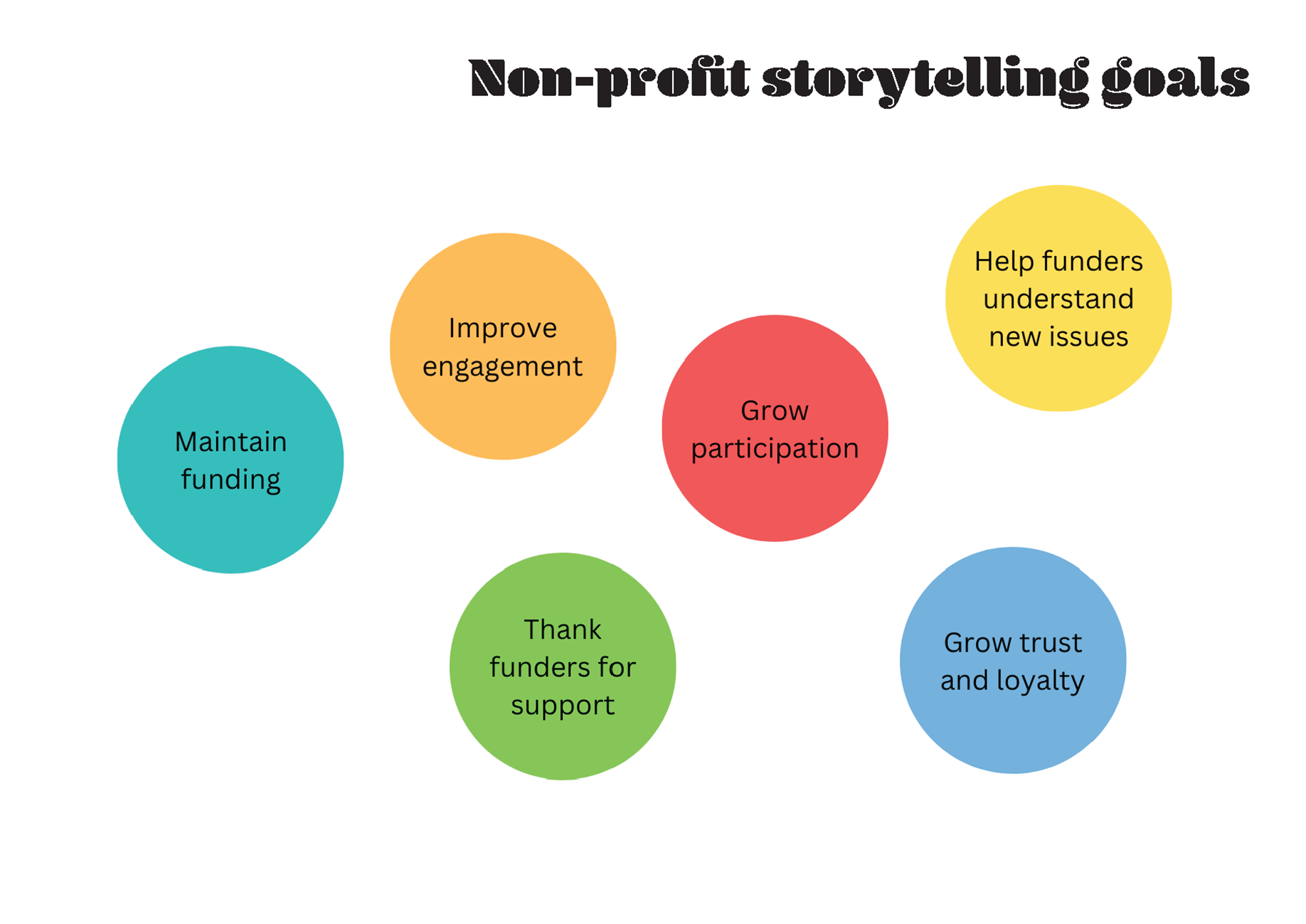
Challenges in collecting stories:
• Children prefer more engaging activities
• Children can be shy
• Children might not always recognise the story's potential
• Trauma aspect - not every child is in a position to be able to expand on their personal story
• Possible risk of not receiving written permission from guardians for the workshop/activity
• Meeting legal standards to work with children
• Challenges in collecting children's stories
• Children can be shy
• Children might not always recognise the story's potential
• Trauma aspect - not every child is in a position to be able to expand on their personal story
• Possible risk of not receiving written permission from guardians for the workshop/activity
• Meeting legal standards to work with children
• Challenges in collecting children's stories

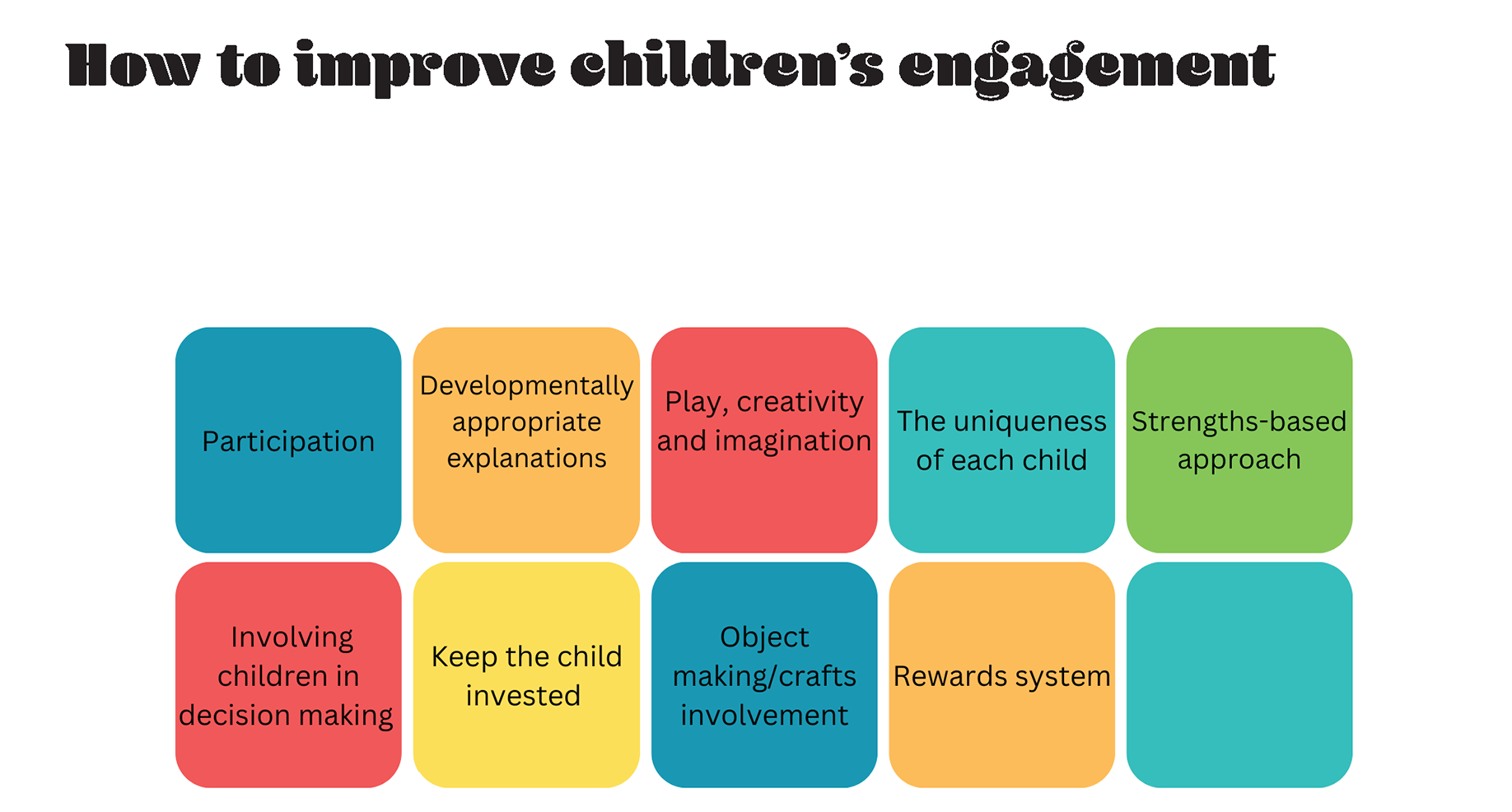

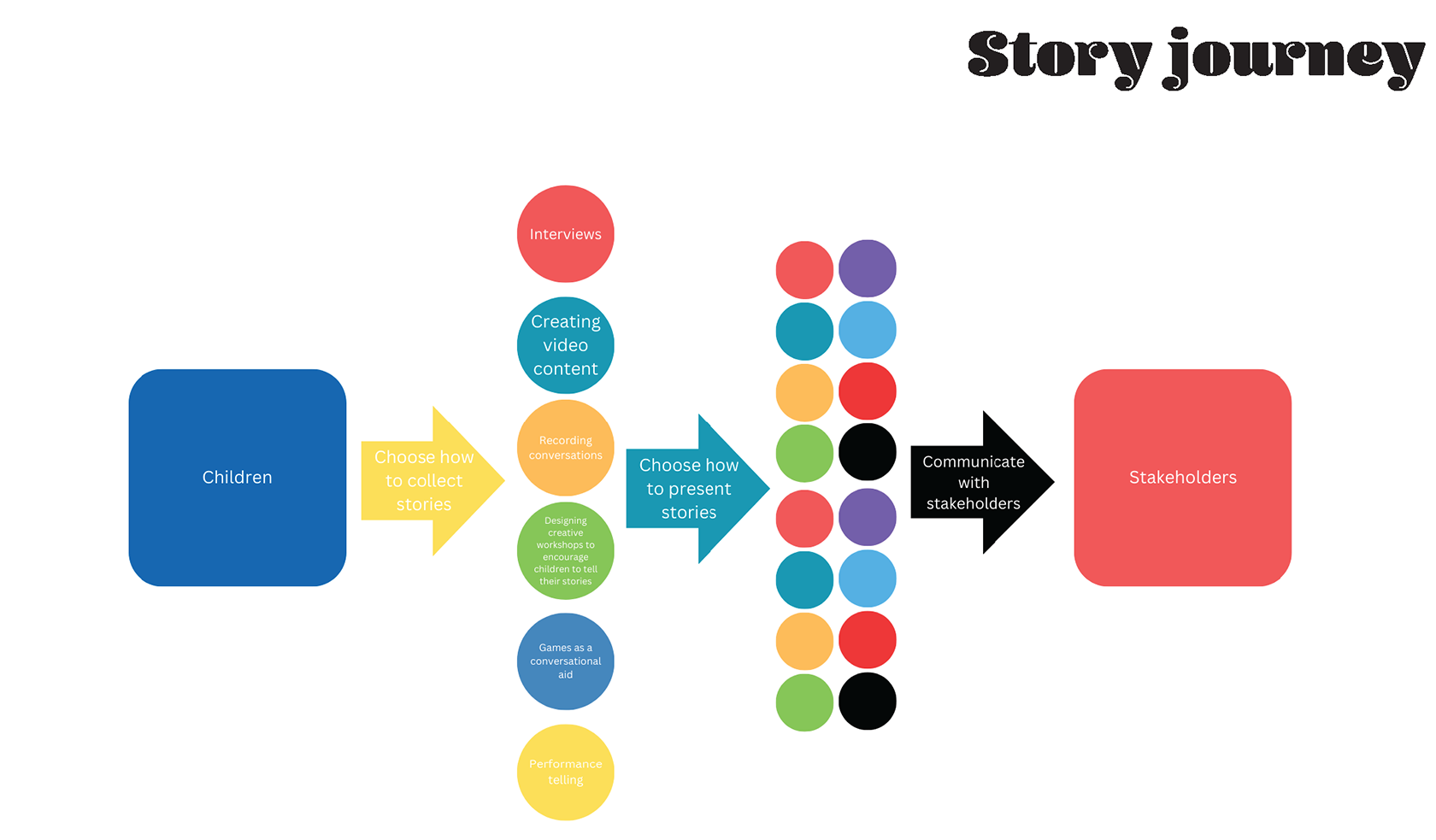

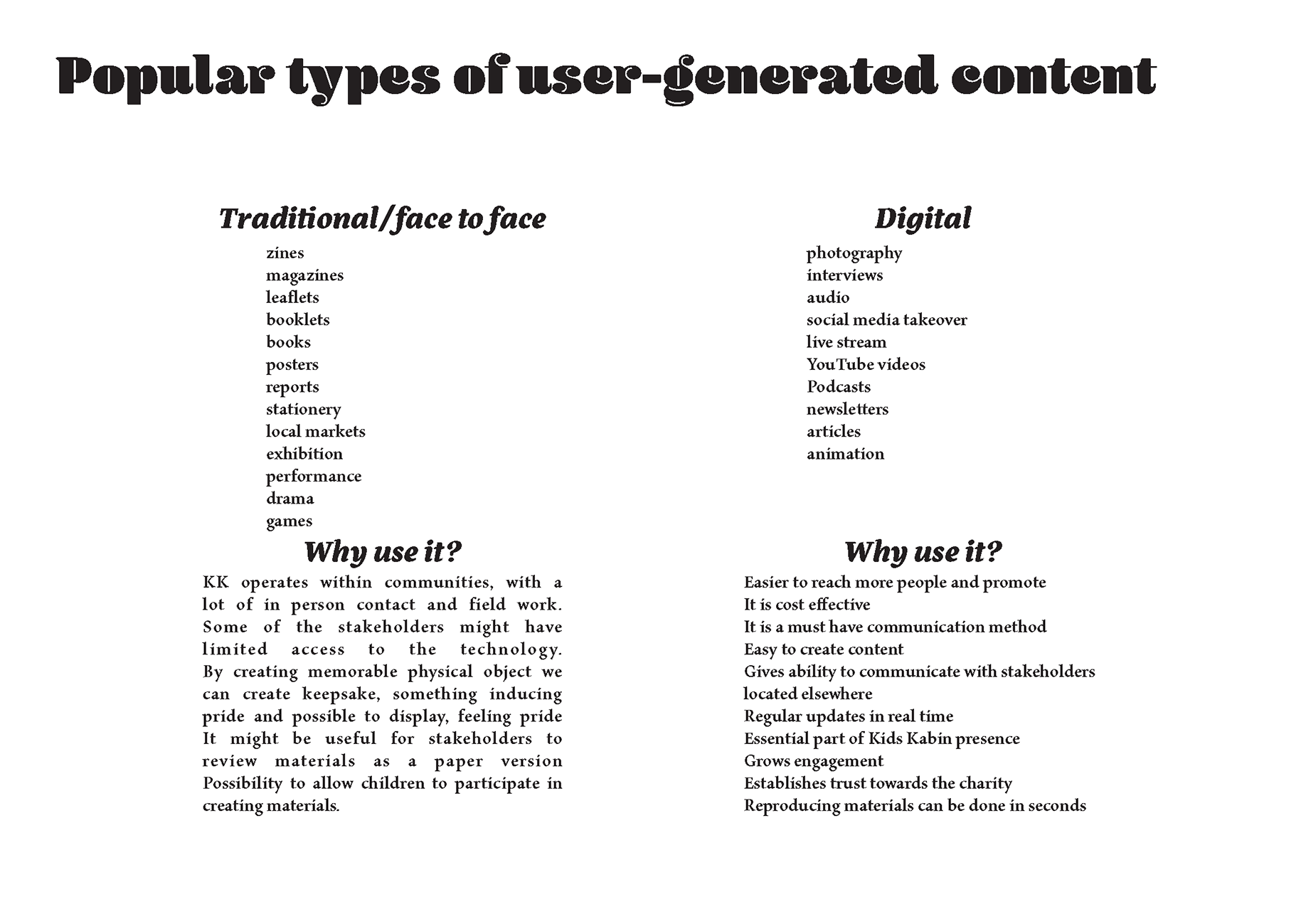

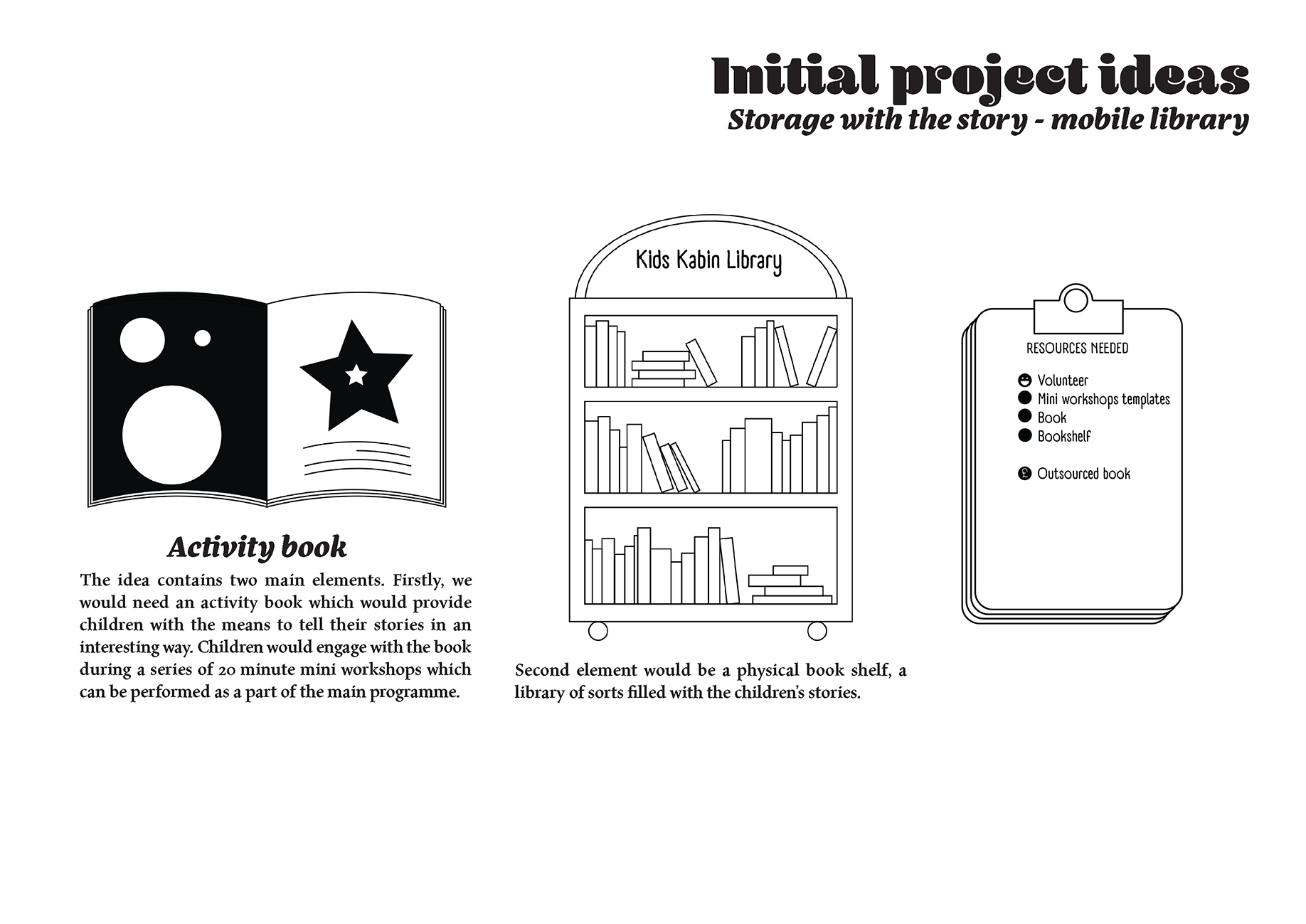
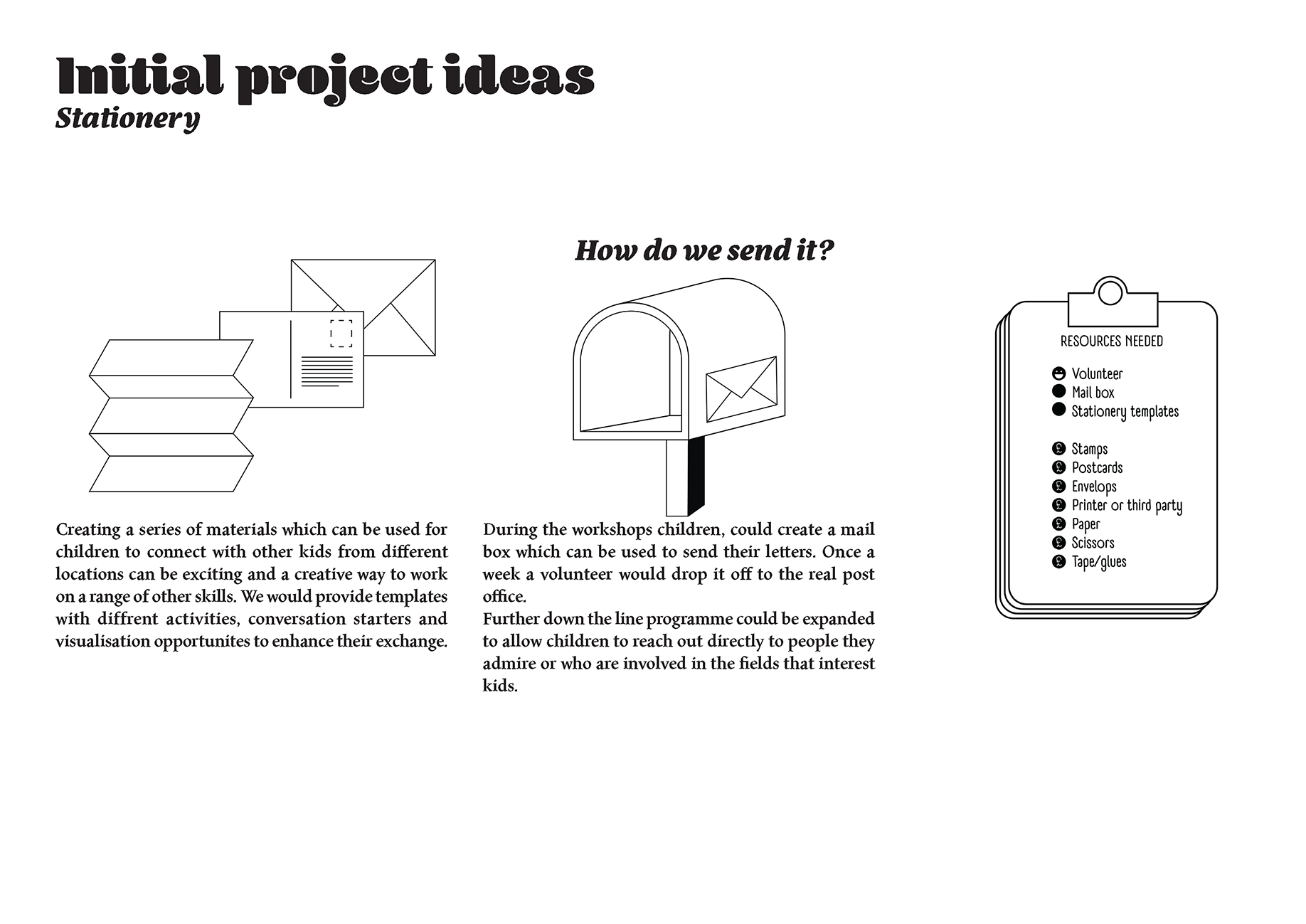
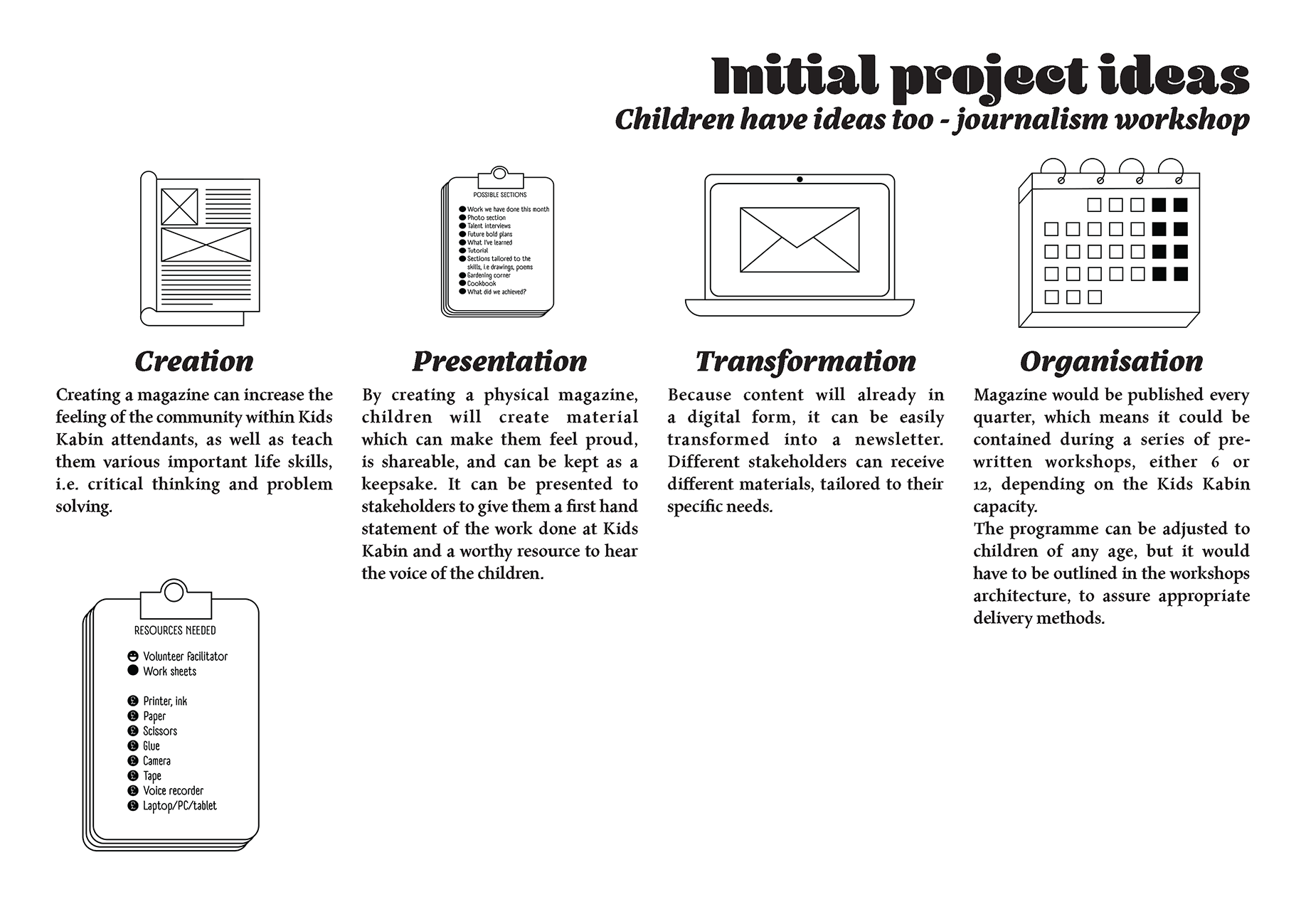

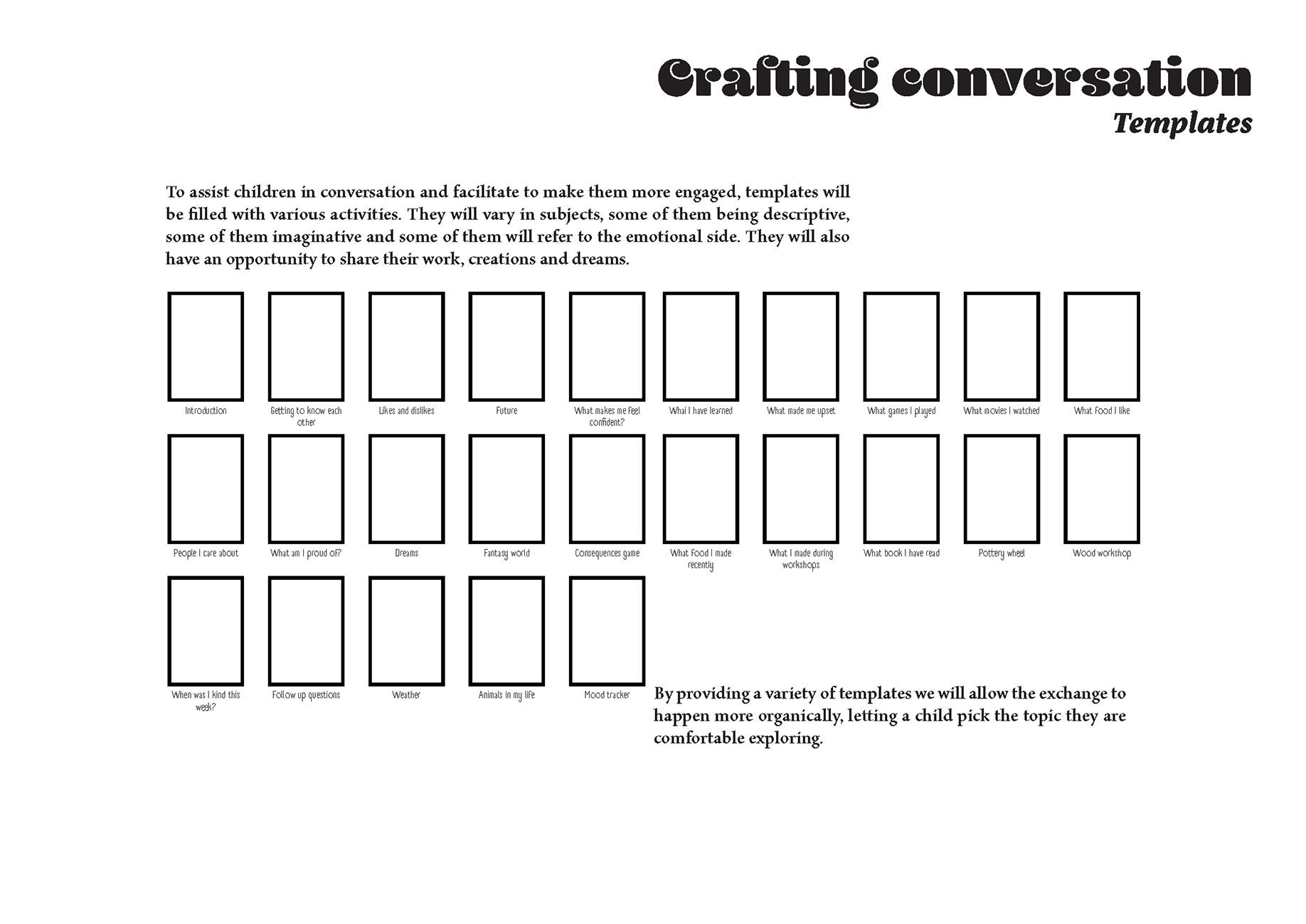
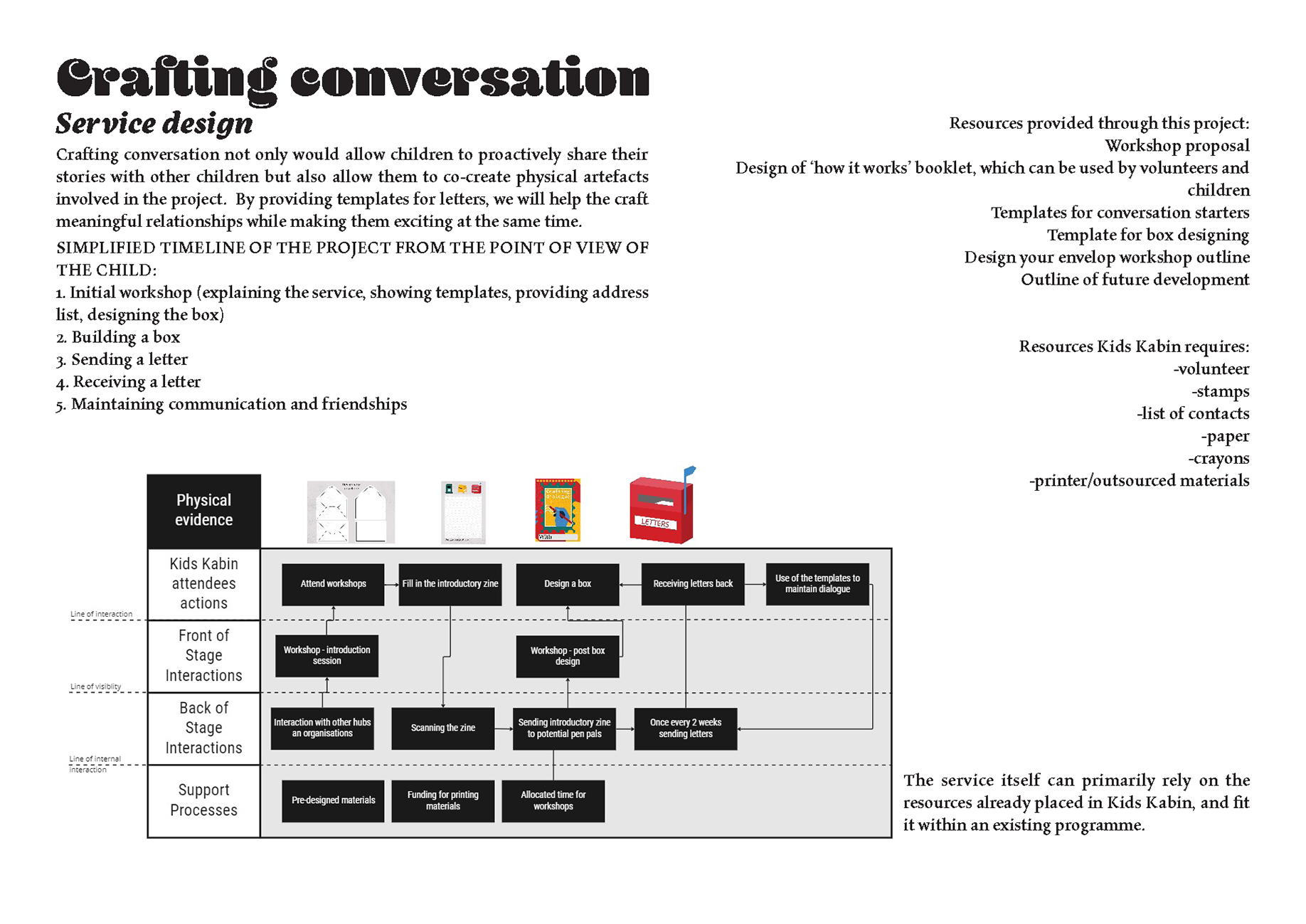
During the times when communication happens mainly through digital mediums, it is beneficial to design that service not only in line with Kids Kabin’s hands-on, crafted approach but also by considering what would be the best way to upkeep a conversation between children.
It is intended to create a letter-writing service that helps Kids Kabin in facilitating those conversations in a way that can encourage children to share their stories and experiences, whilst simultaneously not being a burden on Kids Kabin’s resources.
It is intended to create a letter-writing service that helps Kids Kabin in facilitating those conversations in a way that can encourage children to share their stories and experiences, whilst simultaneously not being a burden on Kids Kabin’s resources.
Workshop 1
Letting children design a box while we explain the project can help us in creating suspense and excitement about the letter-writing process. The creative process required to design and make a cardboard box will be the opportunity to co-create their part of the service. Personal connection with the box will only grow over time when new letters will begin to arrive.
Goal:
Familiarising children with the idea, designing and making a cardboard post-box
Expected outcome:
Children create their personal post-box, which in the future will be the way to receive letters back
Participants:
A volunteer, kids from Kids Kabin
Programme:
Crafting conversation - how do they like to communicate? What makes it hard? (20 min.)
What are we doing here? Activities about letter writing (20 min.)
Design the post-box (25 min.)
Making a post-box (55 min)
Total: 2 h
Workshop 2
Sending the first letter
Sending the first letter
Creating envelopes is another personal input which children have on the project. The designs can be scanned and reused later, or they can design a new envelope every time they send a letter. An introduction zine will help them to open up and have pride in themselves and the stories they share.
Goal:
Creating materials for the first letter and inspiring them to share their passions, be curious about potential new friendships and induce curiosity.
Expected outcome:
Children create their personal envelopes and complete an introductory zine, which now can be sent to other organisations.
Participants:
A volunteer, kids from Kids Kabin
Programme:
How would you describe yourself using shapes and colours? (20 min.)
Designing the envelope (20 min.)
Introduction to the zine and completing the first page (20 min.)
What do you find interesting in other people? What do you like about your friends? – finishing the zine (50 min)
Total: 1 h 50 min.
INTRODUCTION ZINE
LETTER TEMPLATES


